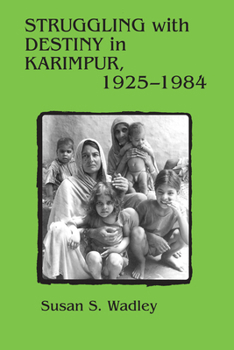Struggling with Destiny in Karimpur, 1925-1984
Select Format
Select Condition 
Book Overview
Susan Wadley first visited Karimpur-the village "behind mud walls" made famous by William and Charlotte Wiser-as a graduate student in 1967. She returned often, adding her observations and experiences to the Wisers' field notes from the 1920s and 1930s. In this long-awaited book, Wadley gives us a work of unprecedented scope: a portrait of an Indian village as it has changed over a sixty-year period.
She hears of changes in agriculture, labor relations, education, and the family. But Karimpur's residents do not speak with one voice in describing the ways their lives have changed-viewpoints vary considerably depending on the speaker's gender, economic status, and caste. Using cultural documents such as songs and stories, as well as data on household budgets and farming practices, Wadley examines what it means to be poor or rich, female or male. She demonstrates that the forms of subordination prescribed for women are paralleled by those prescribed for lower castes.
Villagers also speak of political struggles in India, and of the importance of religion when confronting change. Their stories, songs, and life histories reveal the rich fabric of Karimpur and show how much can be learned from listening to its people.
She hears of changes in agriculture, labor relations, education, and the family. But Karimpur's residents do not speak with one voice in describing the ways their lives have changed-viewpoints vary considerably depending on the speaker's gender, economic status, and caste. Using cultural documents such as songs and stories, as well as data on household budgets and farming practices, Wadley examines what it means to be poor or rich, female or male. She demonstrates that the forms of subordination prescribed for women are paralleled by those prescribed for lower castes.
Villagers also speak of political struggles in India, and of the importance of religion when confronting change. Their stories, songs, and life histories reveal the rich fabric of Karimpur and show how much can be learned from listening to its people.
Format:Paperback
Language:English
ISBN:0520084071
ISBN13:9780520084070
Release Date:July 1994
Publisher:University of California Press
Length:319 Pages
Weight:1.20 lbs.
Dimensions:0.8" x 5.5" x 9.0"
Related Subjects
Anthropology Asia Cultural Europe History India Politics & Social Sciences Social Science Social Sciences WorldCustomer Reviews
1 rating
Introducing rural India
Published by Thriftbooks.com User , 17 years ago
Dr. Wadley did justice to this book that was started back in 1925. This is continuation of the original research and fieldwork done by the Wisers. If you are researching India, rural India, Indian colonial and post-colonial history, North India,economically developing nations on an anthropological scale, this book is a good start. It is an inviting introduction to the above areas mentioned and more. I do have one word of caution for anyone who is not familiar with India or Hindi, you will encounter some unfamiliar Hindi words in the chapters written by Charlotte Wiser. Some are explained, some like sahib (boss), are not. I think this takes away from the contextual meaning some, but can be an inviting suggestion to learn a new language (as I am doing) as well.





